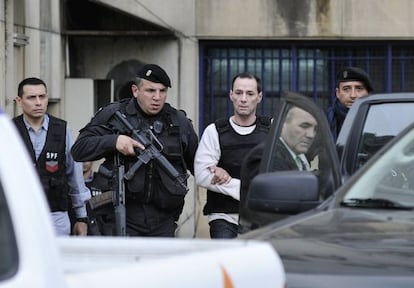Prison escape of three hitmen sparks political scandal in Argentina
One of the fugitives had accused an ex-Fernández de Kirchner official of drug trafficking


The prison breakout of three high-profile hitmen from a maximum security complex in Buenos Aires province over the weekend risks developing into a huge political scandal, just as President Mauricio Marci’s term in office gets underway.
During the recent election campaign, one of the now-fugitives had accused Aníbal Fernández, the former governor of Buenos Aires province and ex-Cabinet chief of past President Cristina Fernández de Kirchner, of being the mastermind of the murders the three were convicted of committing.
One of the now-fugitives accused an ex-Cabinet chief of being the mastermind behind three murders
Martín Lanatta, who was still at large on Tuesday, also alleged last August in a televised interview from prison that Aníbal Fernández was also head of a drug-trafficking ring.
Fernández lost the gubernatorial race in October to María Eugenia Vidal, a member of Macri’s party.
At around 2.45am Sunday, Lanatta, armed with a toy gun, escaped with his other two accomplices from the General Alvear prison, speeding away in a Fiat Uno that belonged to one of the prisoners. The prison is located about 219 kilometers south of Buenos Aires.
“Mafia organizations and drug traffickers who think that they can act above the law are going to encounter a national government and provincial states working together [to stop them],” said Marcos Peña, Macri’s Cabinet chief.
Peña gave his full support to Vidal for firing penitentiary officials who have been appointed during the Buenos Aires provincial government of Daniel Scioli, who unsuccessfully ran against Macri as the official kirchnerite candidate.
For his part, Aníbal Fernández blamed rivals in the Peronist movement for trying to tarnish his reputation.
“Everything was made up to hurt my reputation one week before the elections,” he said.
The brother of one of the three fugitives, Franco Schillaci, said he feared for his life and alleged that he has been under police pressure not to file charges against President Fernández de Kirchner’s ex-Cabinet chief.
The story began during 2007, when Cristina Fernández de Kirchner ran for president for the first time. Among her major donors was pharmaceutical businessman Sebastián Forza, who was brutally murdered along with two other colleagues the following year by Lanatta and his accomplices.
The brother of one of the fugitives said he has been under police pressure not to file criminal charges against the former Buenos Aires governor
A subsequent judicial investigation showed that the motives for the killings may have been linked to an attempt to illegally traffic ephedrine with the help of drug connections in Mexico. José Ramón Granero, who served as anti-drug czar between 2004 and 2011, is facing charges for failing to establish enough controls for importing ephedrine.
Even though Aníbal Fernández was able to defeat his Peronist rival in the August primaries after the drug allegations surfaced, he was hurt by the accusation when they resurfaced during the gubernatorial race against Vidal,
“The people look at Aníbal and then they look at me, and they know who can help their kids give up drugs,” Vidal said during the campaign. Her surprising victory ended 28 years of Peronist governments in Buenos Aires province.
President Macri has said that fighting drug trafficking will be one of the top priorities of his administration.
Cristian Citterio, the prosecutor who investigated the triple murders in 2008, said that the three inmates had help from the outside and fled the complex disguised as prison guards.
About 600 officers from the Buenos Aires police force are taking part in the search for the fugitives.
English version by Martin Delfín.
Tu suscripción se está usando en otro dispositivo
¿Quieres añadir otro usuario a tu suscripción?
Si continúas leyendo en este dispositivo, no se podrá leer en el otro.
FlechaTu suscripción se está usando en otro dispositivo y solo puedes acceder a EL PAÍS desde un dispositivo a la vez.
Si quieres compartir tu cuenta, cambia tu suscripción a la modalidad Premium, así podrás añadir otro usuario. Cada uno accederá con su propia cuenta de email, lo que os permitirá personalizar vuestra experiencia en EL PAÍS.
¿Tienes una suscripción de empresa? Accede aquí para contratar más cuentas.
En el caso de no saber quién está usando tu cuenta, te recomendamos cambiar tu contraseña aquí.
Si decides continuar compartiendo tu cuenta, este mensaje se mostrará en tu dispositivo y en el de la otra persona que está usando tu cuenta de forma indefinida, afectando a tu experiencia de lectura. Puedes consultar aquí los términos y condiciones de la suscripción digital.








































